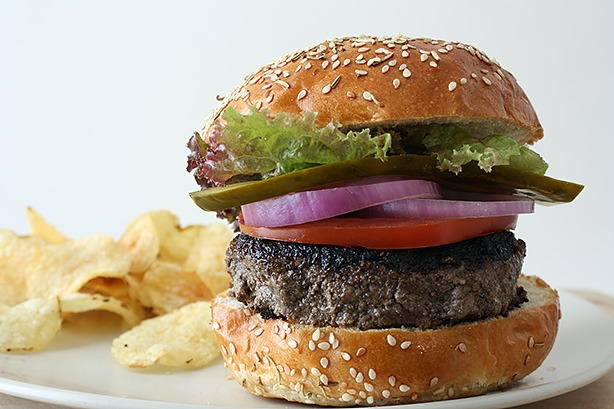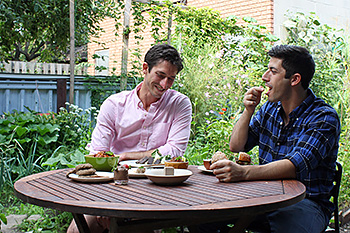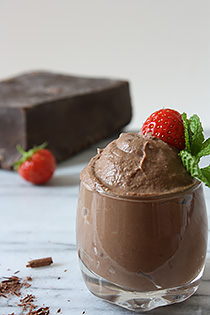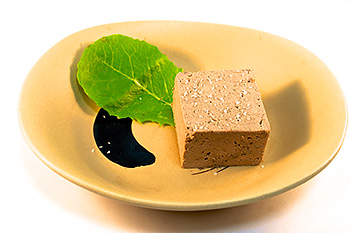
A burger made from C-fu FOODS' bug-based protein. The C-fu model relies on a process that transforms edible insects – currently the company uses mealworms, waxworms, superworms, crickets and black soldier fly larvae – into a functional, non-insectlike form. Image: C-fu Foods/provided.
An idea with legs:
Company that turns bugs into food a top finisher in competition

Eli, left, and Lee Cadesky, M.S. '15, launched C-fu FOODS, a company that turns bug-based proteins into foods from chili to chocolate mousse. Image: provided.
C-fu Foods, a company started by a Cornell food scientist that turns bug-based proteins into foods from chili to chocolate mousse, took third place in the 2015 Global Business Challenge in November.
The business case competition in Brisbane, Australia, challenged academic teams to design sustainable solutions that could help double global food production by 2040.
Lee Cadesky, M.S. '15, a lecturer in the Department of Food Science, and his brother Eli, a business student at the Schulich School of Business at York University, presented their vision of an insect-based food supply chain that can help feed an exploding human population expected to surpass 9 billion by midcentury. The competition's theme of food security fell in line with benefits the brothers see in a future food landscape where insects offer a more sustainable alternative to beef and better flavor than plant-based proteins like tofu.
Why 'C-fu Foods'? According to the company's website, the name stems from both its first food product and reaction to it. "Our first process yielded Cricket Tofu," the site explains. "When we told people what we were working on, their first response was, 'That's Crazy!' "In French, 'C' is pronounced like 'C'est'; C'est Fous means 'That's Crazy!' "We added 'Foods' to our name because we wanted people to know that despite having crazy ideas, we were serious about insects as a food source." |
"We are headed toward a future that is going to have more water in the wrong places and less water in the right places. We need adaptable solutions," Cadesky says of climatic changes that could make insect-based foods from companies like C-fu Foods important additions to the global diet. "Insects are more sustainable to farm, and the technology is just getting started."
At Cornell, Cadesky's research focused on dairy protein rheology and how protein networks form gels, a general term food scientists use for materials that are partly liquid and partly solid, such as cheese and pudding. While insect proteins are different in structure from dairy proteins, the general principles of polymer science as they apply to food proteins are adaptable, Cadesky says, and informed his work developing C-fu.
The Global Business Challenge hosted by the Queensland University of Technology gave each of the six finalists a case study of a unique country, giving the teams about 40 hours to prepare a 50-page business plan and a 15-minute presentation. The Cadesky brothers spent two days locked in an apartment poring over national development plans of South Africa and seizing on the economic and nutritional benefits of the mopane worm, an edible caterpillar consumed domestically and popular as a delicacy in Europe, where it fetches a high price in export markets.

C-fu Foods' chocolate mousse. Image: C-fu Foods/provided.
Already an established food product in South Africa, mopane is one of around 2,000 species of insects worldwide known to be edible, Cadesky says. Companies like C-fu see untapped opportunities for inexpensive and sustainable alternatives to replace or supplement other food sources, especially protein.
The C-fu model relies on a process that transforms edible insects -- currently the company uses mealworms, waxworms, superworms, crickets and black soldier fly larvae -- into a functional, non-insectlike form. "It's a general process, kind of like making cheese, only with bugs," Cadesky says.
Most current products on the market are relegated to protein bars. The hope is that bugs become an easy-to-use, protein-dense ingredient sparking the imagination of cooks and food-manufacturers everywhere, and just as likely to be crumbled and fried like ground beef or used as a base in ice cream.
The future, Cadesky envisions, is of his company offering restructured insect protein as a meat, dairy and egg replacer with all the protein and nutrients of traditional foods -- and none of the squirmy resemblance to insects that make many blanch.
"There's a reason we don't eat bugs now," Cadesky says. "No one wants to look at them, no one certainly wants to eat a whole bowlful of mealworms. We can sympathize with that."

C-fu Foods' protein product in a more raw form. "It's a general process, kind of like making cheese, only with bugs," Lee Cadesky says. Image: C-fu Foods/provided.
The beauty of insects-as-food rests in part on the sustainability gains that can't be matched by traditional livestock. Bugs, unlike animals, can be farmed vertically and require only a fraction of the land needed for mammals. There are similar savings with water: bugs get all their requirements from their feed, which in turn can be supplied through less resource-intensive means.
With their third-place finish, C-fu received a cash prize in Australian dollars that converts to roughly $7,200. Cadesky said he and his brother plan to use the money to develop new technology to make spray-dried protein concentrates similar to dissolvable whey protein.
"We are trailblazing this research," Cadesky says of the science needed to fully functionalize insect protein. "We see ourselves on the forefront to really answer these questions no one thought needed answering before."
If the science presents a challenge, getting people accustomed to eating bugs may prove just as difficult. But, Cadesky says, that job may get easier as consumers see "what they can be and what they can offer from a sustainable, nutritional, functional and culinary standpoint. We are just scratching the surface on a whole new universe of food."
Related info
Cornell Chronicle: Mealworm 'meat' team competes to feed the world
YouTube: C-fu's presentation at Brisbane, Australia challenge, November 2015